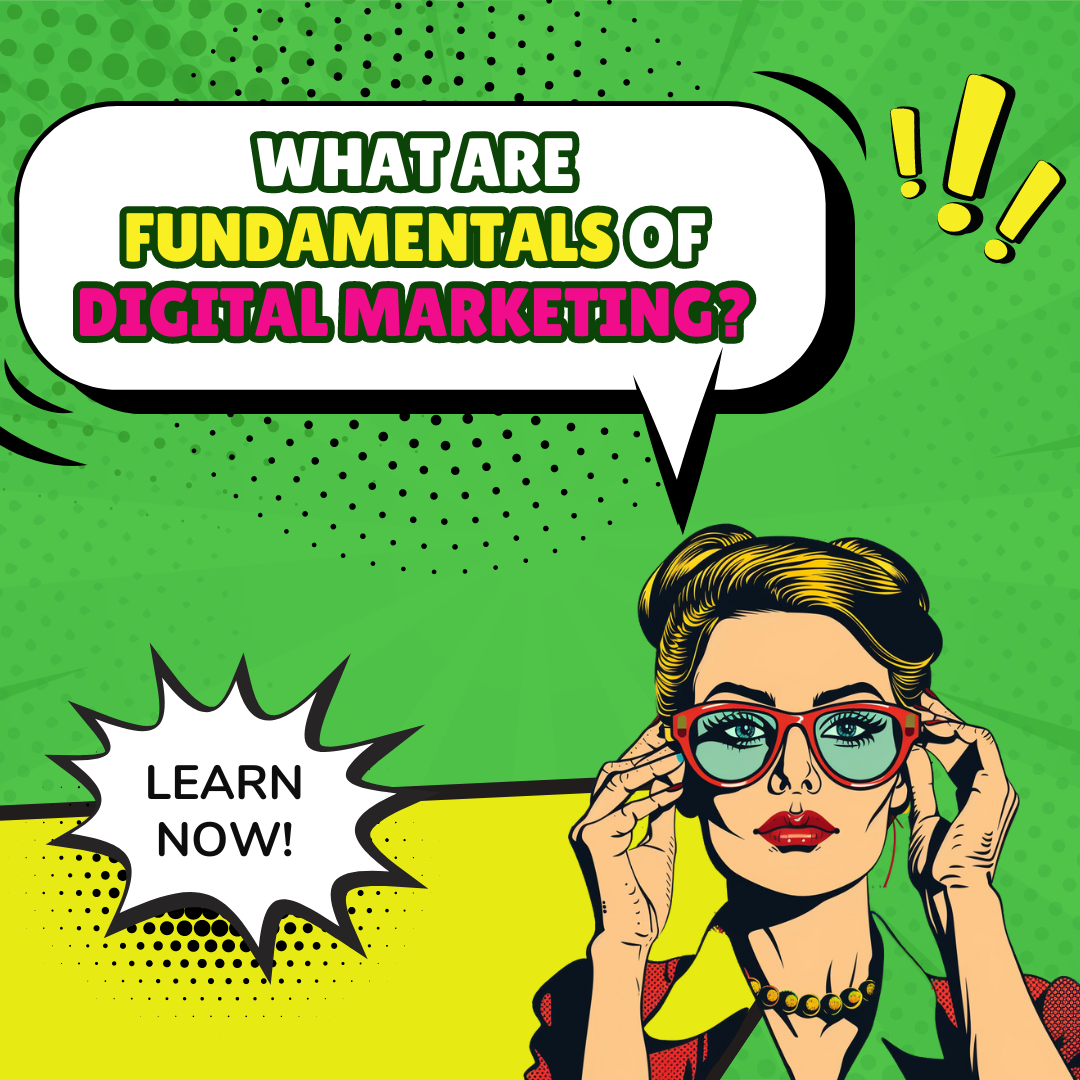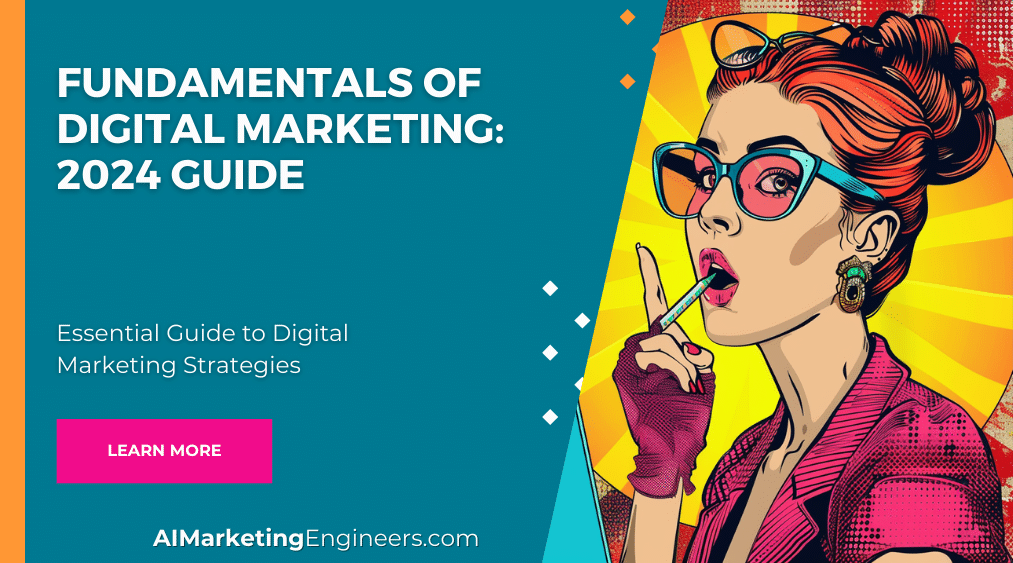Key Takeaways
✅ Growing Importance of Mobile Marketing: In 2024, mobile devices are expected to account for over 75% of global internet usage. This underscores the need for businesses to prioritize mobile-friendly website designs, responsive email templates, and mobile-optimized advertising strategies.
✅ Rise of Video Content: Video content continues to dominate digital marketing, with projections indicating that it will represent 82% of all internet traffic by 2024.
✅ Increasing Investment in Artificial Intelligence (AI): AI is transforming digital marketing, with businesses projected to spend over $20 billion on AI-powered marketing technologies by 2024.

Introduction
Welcome to the digital age, where marketing is not just a buzzword but the frontline of business strategy. In this era of endless connectivity, digital marketing stands as a beacon, guiding businesses to connect with customers in ways that were once mere science fiction. Why is digital marketing so crucial for today's businesses, you ask? It's simple: adapt or fall behind.
In the coming sections, we'll journey through the vibrant landscape of digital marketing. From the bustling streets of social media to the intricate byways of search engine optimization, we will explore the highways and byways of the digital world. Our goal? To arm you with the knowledge to craft a digital marketing strategy that resonates with your audience and aligns with your business aspirations.
Evolution of Digital Marketing
The shift from traditional to digital marketing has been transformative. No longer do businesses rely solely on print, broadcast, or physical marketing efforts; they now integrate digital strategies to reach consumers where they spend a significant portion of their time: online. This evolution has been driven by the increasing use of the internet and mobile devices.
Traditional vs Digital Marketing
Traditional marketing includes physical advertisements such as billboards, flyers, and TV commercials, while digital marketing encompasses online endeavors, working across websites, search engines, and social media platforms. A key difference is the ability for interactions and engagements with consumers in real-time through digital channels.
 Digital Marketing Forms
Digital Marketing Forms
- Search Engine Optimization (SEO): Improving a website to increase its visibility when people search for products or services.
- Pay-Per-Click (PPC): Advertisers pay a fee each time one of their ads is clicked.
- Social Media Marketing: Platforms like Facebook, Twitter, and Instagram to engage with audiences.
- Email Marketing: Sending emails to prospects and customers.
- Mobile Marketing: Reaching customers through mobile devices, including app-based marketing, in-game advertising, and SMS.
- Affiliate Marketing: Earning commission by promoting other people's (or company's) products.
- Content Marketing: Creating and promoting content assets for generating brand awareness, traffic growth, lead generation, and customers.
Customer Engagement Through Digital Channels
Digital marketing channels are vital for customer engagement. For instance, 73% of mobile phone users might use their devices to make decisions while in-store. Brands can capture these micro-moments by optimizing mobile experiences and providing valuable content at just the right time.
Importance of Strategy
Having a digital marketing strategy is crucial to guide decision-making and resource allocation, ensuring all marketing efforts are cohesive and in line with business objectives.
Steps to Develop a Strategy
- Analyze the Target Audience: Understand demographics, preferences, and behaviors.
- Set Clear Goals: Identify what you aim to achieve with digital marketing.
- Choose the Right Channels: Select the platforms where your target audience spends time.
- Define Key Metrics: Determine how success will be measured.
- Allocate Budget: Plan how much you’ll spend on each digital channel.
- Create a Content Calendar: Organize when and where content will be published.
- Implement and Monitor: Execute your strategy and track performance for continuous improvement.
Tools for Strategy Development
Digital marketing strategies can be developed with tools such as Google Analytics, SEMrush, Hootsuite, MailChimp, and HubSpot. These platforms assist with various aspects like analytics, automation, customer relationship management, and more.
AI Marketing Engineers Recommendation
In the realm of digital marketing, the fundamentals are critical for success. Effective digital marketing strategies involve a multitude of interconnected parts working together to engage customers, convert leads, and grow businesses. Below are key recommendations that every marketer should consider as part of their digital strategy:
1. Understand Your Audience:
- Leverage data analytics to gain insights into your target audience's demographics, behaviors, preferences, and pain points.
- Personalize content and offers to resonate with different segments of your audience.
2. Define Measurable Goals:
- Set Specific, Measurable, Achievable, Relevant, and Time-bound (SMART) goals for your marketing campaigns.
- Use Key Performance Indicators (KPIs) to track progress and assess the effectiveness of your strategies.
3. Embrace SEO and Content Marketing:
- Invest in Search Engine Optimization (SEO) to improve visibility and ranking in search engine results pages (SERPs).
- Create valuable and relevant content tailored to your audience’s interests and needs to establish authority and drive organic traffic.
4. Utilize Pay-Per-Click (PPC) Advertising:
- Incorporate PPC campaigns like Google Ads to generate immediate traffic and supplement organic growth.
- Continually optimize PPC ads by analyzing click-through rates (CTR), conversion rates, and return on ad spend (ROAS).
5. Leverage Social Media Marketing:
- Choose platforms that align with where your target customers are most active.
- Engage with your audience through consistent posts, conversations, and community building.
6. Adapt to Marketing Automation and AI:
- Implement marketing automation tools for routine tasks to increase efficiency and productivity.
- Use AI-driven insights to optimize campaigns through predictive analytics, customer segmentation, and personalization.
7. Prioritize Mobile Marketing:
- Ensure your website and content are mobile-friendly, considering that a significant portion of traffic comes from mobile devices.
- Consider mobile-specific advertising options such as in-app ads, SMS marketing, and responsive design.
8. Engage in Email Marketing:
- Develop a strong email strategy for direct communication with your audience.
- Segment your email list for targeted and personalized campaigns.
9. Track and Analyze Data:
- Regularly review web analytics to understand customer behavior and campaign performance.
- Adjust strategies based on data-driven insights to improve ROI.
10. Stay Updated with Digital Marketing Trends:
- Keep abreast of emerging technologies, platforms, and changes in consumer behavior.
- Be open to experimenting with new channels and tactics, like influencer marketing or virtual reality experiences.
By incorporating these recommendations into your digital marketing strategy, you will enhance your ability to connect with customers in a meaningful way, ultimately driving business growth. Always remember, digital marketing is an evolving field and staying flexible, and data-informed is key to sustaining success. AI Marketing Engineers is poised to help you stay at the forefront of this dynamic landscape, ensuring your brand remains competitive and future-proof.
Conclusion
The digital era has irrevocably transformed the marketing landscape, presenting businesses with unparalleled opportunities for growth and customer engagement. Through the exploration of the fundamentals of digital marketing, we recognize the significant departure from traditional methodologies and the emergence of a multifaceted and dynamic terrain where strategy, content, and technology intersect.
Understanding this digital terrain is pivotal. A comprehensive strategy blends various forms of digital marketing, each serving a unique function and catering to different segments of the consumer base. From the omnipresence of SEO to the immediacy of PPC and the personal touch of email marketing, these tools allow businesses to pinpoint and captivate their intended audience like never before.
Content remains the cornerstone of digital marketing, with its undisputed ability to build connections, enhance brand visibility, and initiate a dialogue with consumers. Meanwhile, SEO and PPC offer a blend of organic and paid strategies to elevate a brand's presence on search engines—each essential, yet distinct in approach and outcome. Social media channels provide an informal platform to engage users in real-time, nurturing relationships and cultivating community around a brand.
Executing a successful digital marketing strategy is not without its challenges; it demands a solid understanding of the audience, clear and measurable goals, as well as an adept use of the plethora of tools at our disposal. Technology serves as a beacon, guiding marketers through analysis and implementation, delivering insights that drive smarter decisions, and creating immersive experiences for the consumer.
In closing, the essence of digital marketing lies in its versatility and precision—attributes that are invaluable in today's rapidly evolving digital world. The fundamentals discussed serve as a map for businesses navigating the complex digital ecosystem, aiming to reach and resonate with their audience compellingly and effectively. The key takeaway is clear: embracing digital marketing is not merely advantageous but necessary for any business aspiring to thrive and maintain relevance in an increasingly digital-centric marketplace.
FAQs
Digital marketing refers to the marketing of products or services using digital technologies, primarily on the internet, but also including mobile phones, display advertising, and any other digital medium. It encompasses a range of strategies designed to increase brand awareness, engage with customers, and drive sales.
Digital marketing is critical in today's online world as it allows businesses to reach an extensive audience, tailor messages to specific market segments, track and analyze results for better campaign performance, and adjust strategies in real time. It also facilitates interaction with customers, providing valuable insights and fostering brand loyalty.
Key elements of a successful digital marketing strategy include understanding your audience, setting measurable objectives, choosing the right channels and tactics, producing engaging content, leveraging data analytics for optimization, and maintaining flexibility to adapt to market changes.
SEO improves a website's visibility in the organic search engine results, attracts higher-quality traffic, increases user trust and credibility, enhances user experience, and contributes to higher conversion rates. It is a cost-effective way to maintain a competitive edge in the digital marketplace.
Types of digital advertising include pay-per-click (PPC), display ads, social media ads, video advertising, native advertising, remarketing, and affiliate marketing. Each type serves different strategic purposes and offers unique advantages depending on the target audience and campaign goals.
A homepage serves as the main entrance and navigational hub of a website, providing a broad overview of what a brand offers. In contrast, a landing page is a single web page with a focused goal, designed to convert visitors from a specific marketing campaign.
A call-to-action is a prompt within marketing materials that urges the audience to take an immediate action, such as 'Buy Now,' 'Subscribe,' or 'Learn More.' CTAs are crafted to guide users towards the next step in the customer journey and ultimately lead to conversions.
Search Engine Marketing involves gaining website traffic by purchasing ads on search engines, and it also includes SEO efforts. SEM is a broader term that combines the power of paid search advertising with organic search tactics to maximize visibility and traffic.
Conversion rate is a metric that measures the percentage of website visitors who take a desired action, such as completing a purchase, signing up for a newsletter, or filling out a contact form. It is a crucial indicator of the effectiveness of a website's design and marketing efforts.
Content marketing is a strategic marketing approach focused on creating and distributing valuable, relevant, and consistent content to attract and retain a clearly defined audience. Its objective is to drive profitable customer action, such as engagement or purchase, by fostering trust and establishing authority.









